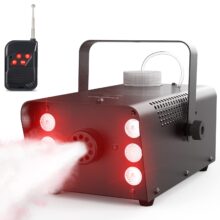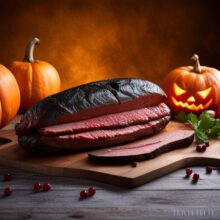When to Wrap a Brisket

There are many different arguments as to when to wrap a brisket. You should keep in mind that aluminum foil is nonporous, and moisture must go somewhere. If you wrap your brisket in aluminum foil, the bark will not set and will eventually become mushy. Instead, use butcher paper, which is porous. This will help prevent mushy bark by absorbing moisture and fat.
Arguments for wrapping brisket
There are several arguments for wrapping a brisket. The process makes the meat more tender. Briskets with good bark will have deep flavors, and wrapping them too early prevents bark formation. However, wrapping them too late may result in briskets that are dry and flavorless. The ideal time to wrap a brisket depends on the type of brisket and the session in which it is cooked.
Briskets can also be served without resting. The drained juices can be used to “baste” sliced brisket. The meat should be at a temperature that is acceptable to cut into. Briskets that are too hot are difficult to slice, and steam cannot be recovered once it has evaporated. To avoid this problem, allow the meat to cool to a suitable temperature before slicing it.
Another reason to wrap a brisket is the way it conducts heat. It also traps smoke and thereby protects the meat from the smoky atmosphere. While it is difficult to control the temperature inside the oven, foil wrapping a brisket will allow you to do the same. This is a great option if you’re in a hurry or don’t want to wait until the last minute to finish cooking the meat.
Using aluminum foil for wrapping a brisket is a good idea because it does not allow any water to pass through. The foil also provides a good barrier against evaporation. Peach paper, on the other hand, is a more breathable option that you can use if you want to speed up the cooking process. It will also help create more bark if wrapped properly. This can be very effective if your brisket is grilled for an extended period of time.
Unlike ribs, brisket can be left unwrapped while resting. It doesn’t have to be covered to retain the heat. But there are some other advantages to wrapping a brisket. It will stay moist for one to two hours after it’s cooked, and it won’t be dry. The best way to make a brisket with moist flavor is to cook it with foil, or at least wrap it loosely in aluminum foil.
Issues with wrapping brisket too early
When you wrap a brisket, it is important to wrap it well enough to keep moisture from getting inside. Briskets should have a deep mahogany color. However, wrapping it too early can result in inadequate smoke penetration. To solve this problem, use aluminum foil or another non-porous material. Wrapping a brisket too early can lead to a less than perfect roast.
Butcher paper will add a unique flavor and texture to the brisket. While it won’t add as much smoke and crispness as foil, butcher paper will help prevent over-wetness and keep the brisket moist. While it may seem like an unnecessary step, it’s a simple way to ensure a succulent brisket. Use pink butcher paper when wrapping a brisket.
A high internal temperature is important when wrapping a brisket, as this prevents bacteria from growing. When wrapped too early, the meat can stall and lose moisture, causing the meat to taste dry. However, wrapping it too early can reduce flavor and savor. It’s better to wrap a brisket after it stalls than too early. However, if you’re unsure of how to wrap it, follow these tips.
One important thing to remember is that the wrapped brisket tends to have a softer bark than the “naked” variety. When wrapped in aluminum foil, the meat remains moist, which is a negative for the bark. It’s also a potential cause of undercooked brisket. Despite its benefits, wrapped briskets often lack the bark of the brisket and muffle the smoky taste of the rub.
Another key issue to consider with wrapping a brisket too early is its collagen content. The collagen in brisket may require more time to break down. If it’s wrapped too early, the meat might need more time to develop properly and become tender. When wrapping a brisket, let it rest for half an hour. Then, slice it. For optimal tenderness, cut it against the grain.
Problems with wrapping brisket in butcher’s paper
If you want to make your brisket more moist and tender, you can wrap it in butcher’s paper. It is a good choice for barbecuing, as it allows the moisture and smoke to escape and the meat to retain its juiciness. Problems with wrapping brisket in butcher’s paper include moisture loss and a different texture.
The first problem with wrapping brisket in butcher paper is that it causes the outer bark to disintegrate, reducing the bark and flavor. The meat will cook faster when wrapped in butcher paper, but the outer bark will become mushy. Another problem with wrapping brisket in butcher paper is that it prevents the smoke flavor from enhancing the smoky flavor.
The second problem with wrapping brisket in butcher paper is the increased cooking time. While most experts recommend wrapping meat at 150 degrees Fahrenheit, you can use an even lower temperature for optimal results. The ideal wrapping temperature for brisket is between 140-160 degrees Fahrenheit. The longer the meat is wrapped, the less moisture it retains. You can use a thick-gauge butcher’s paper to wrap the meat.
One of the most common problems with wrapping brisket is the moisture that leaks out from the meat. Briskets need to retain moisture, and this is especially true when wrapped in butcher’s paper. Briskets should be wrapped like a birthday present, and the best way to accomplish this is to use larger butcher paper. Make sure you use pink butcher paper as this will ensure a tight seal.
When wrapping brisket in butcher’ kraft paper, it is important to remember that the meat will drop in temperature when wrapped. Once wrapped, it will rise back up to the desired temperature, but this process may take an hour or more. The process is also messy, so make sure to follow the instructions carefully. For the best results, wrap your brisket in butcher’s paper and enjoy your barbecue!
Another common problem is that brisket wraps don’t provide direct heat from the wood chips or chunks. The wrapped meat can cook at a lower temperature and retain moisture, but won’t reach its optimal internal temperature. This is referred to as stalling. This method isn’t difficult, but a little extra care and preparation will pay off in the long run.
Issues with using aluminum foil to wrap brisket
While using aluminum foil is an easy way to wrap a brisket, there are some issues with the substance. While it is convenient to wrap, aluminum foil does not absorb the juices from the meat, which can lead to a less moist brisket. Also, wrapping a brisket too early can result in the bark peeling off. If you’re planning to use aluminum foil, wait until the meat reaches an internal temperature of 185 degrees F before wrapping.
Another issue with using aluminum foil is that it creates a tight seal. This causes the bark to become softer, resulting in a more chewy product. To solve this problem, you can use butcher paper instead. Unlike aluminum foil, butcher paper is a bit harder to find. Watch this video to learn more about the benefits and disadvantages of each type of wrapper.
Another issue with using aluminum foil to wrap briskett is that it can cause the meat to cook faster than you intended. Furthermore, the foil can shred inside the meat, leaving it with a metallic taste. This is not desirable, as you want the meat to be juicy and tender. So, wrapping brisket in foil may not be the best solution. In addition to the above, you may not be able to avoid the soggy finish that results from using aluminum foil.
Another issue with aluminum foil to wrap brisket is that the meat is vulnerable to evaporative cooling. The moisture on the surface evaporates and cools the meat. The heat from the smoker isn’t strong enough to fight this effect. Excess moisture will also evaporate, raising the brisket’s temperature. So, the benefits of foil wraps for briskets are far outweighed by the disadvantages.
Another downside to wrapping a brisket is that it can cause the bark to become too dry. This happens because the meat will take longer to cook if it’s not wrapped. The additional time will make the meat dry and tough. The amount of drying out will depend on the cut and type of brisket you use. Some briskets can be fine without wrapping, while others can end up overcooked and with a bitter taste.
Read more great BBQ articles at Bob's BBQ Tips
Did you miss our previous article…
https://notoriousbob.net/?p=1660



